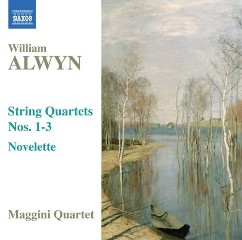William Alwyn – String Quartets Nos. 1-3 (2008)
William Alwyn – String Quartets Nos. 1-3 (2008)

String Quartet No. 1 In D Minor 1 Moderato E Grazioso 2 Allegro Molto 3 Adagio 4 Allegro Vivace, Molto Ritmico String Quartet No. 2, "Spring Waters" 5 Moderato - Lento - Adagio 6 Allegro Scherzando 7 Adagio - Allegro Moderato - Adagio E Tranquillo - Allegro Al Fine String Quartet No. 3 8 Allegro Molto 9 Adagio - Allegro - Adagio 10 Novelette Maggini Quartet: Larraine McAslan (violin) David Angel (violin) Martin Outram (viola) Michal Kaznowski (cello)
Amazingly enough, this superlative 2008 Naxos recording of William Alwyn's three string quartets by the Maggini Quartet is not the works' first recording. A Dutton disc with performances by the Rasumovsky Quartet preceded it in 2005. In the event, both discs bear excellent performances of Alwyn's superbly composed if heretofore nearly completely ignored modernist quartets. Both groups have first-class techniques and alert ensembles, but the Maggini is better at Alwyn's lean and sinewy Allegros and his latter, more aggressive style, while the Rasumovsky is better at Alwyn's long and lyrical Adagios and his earlier, smoother style. Either set of performances would certainly serve those unfamiliar with the repertoire, though the Rasumovsky's coupling of the evocative Three Winter Poems is substantially longer than the Maggini's brief, early Novelette. For the Alwyn addict, of course, nothing less than both will do, though Dutton's digital sound is warmer and deeper than Naxos' cooler, more colorful sound. ---James Leonard, AllMusic Review
Movie buffs know William Alwyn (1905–1985) as one of Britain’s most prolific and innovative film composers, with 70 feature scores to his credit. Fewer music-lovers know that he wrote a wide variety of concert works as well, many created in the romantic style of his film scores. That is regrettable, as Alwyn’s Read more
A perfectionist, Alwyn spent 33 years developing his quartet-writing technique, producing 13 quartets before the ones he finally acknowledged. In 1953, when 48 years old and at the height of his powers, Alwyn published the String Quartet No. 1 while under the spell of Czech music and the sanguine state of his life. The work is sunny and warmly romantic and includes, in the Adagio, a violin solo of startling beauty, one of Alwyn’s most ravishing creations. This quartet is the most conventional of the three, and listeners who enjoy Dvo?ák’s later quartets will feel right at home.
Alwyn was in a very different frame of mind 22 years later. The String Quartet No. 2, the most personal of the quartets, is a darker work of loss and regret. Janá?ek is felt here, but by and large this piece inhabits the austerely chromatic sound world of Schoenberg’s Verklärte Nacht . Again the Adagio, here the final movement, carries the greatest emotional weight, as the aging composer seems to struggle with despondency and impotent rage. The two-movement Third Quartet, Alwyn’s last major work, written in his last year, begins where the Second leaves off. Here, though, the tension and darkness are eventually dispelled by a sweetly romantic second subject that would not have been out of place 31 years (or 131 years) earlier. Where the Second Quartet was anguished, this one is wistful, even, in a brief scherzando segment, bemused. Subsequent returns to consonance, in the final movement, have the effect of a sunset after a storm, and the ending is serene. The disc itself concludes with a premiere recording of Novelette , a piece from 1939 written for publication as part of a series of short quartet works by English composers. Its charm and cleverness suggest that Alwyn may have been too hasty in disowning his earlier quartet works.
There are currently three recordings of these numbered quartets, two available on CD. One, the reputedly excellent Razumovsky Quartet set on Dutton 7168, I have not heard. It apparently can only be purchased through the label’s Web site. This Maggini Quartet CD, continuing an admirable series of British string quartets for Naxos, is the other. With controlled vibrato and sharp attacks, theirs is a compellingly stark, uncompromising, physical approach, stressing the modernity of the works. Lyrical sections, as a result, stand out in bold relief. In this, the solo work of first violinist Lorraine McAslan is particularly praiseworthy, making one regret that she has since left the quartet. The pioneering Quartet of London set on Chandos—the first two quartets were recorded in the presence of the composer—is only available as a download from Chandos’s online store. In dollars and spread over two discs (9219 and 8440), they are fairly expensive, especially compared with this Naxos release. They do, however, include excellent performances of the Rhapsody for Piano Quartet and the String Trio. The London ensemble emphasizes the lyrical qualities of the works with somewhat underplayed dissonances and tempos and attacks that are more subtle and moderate than the Maggini’s. Frankly, I am glad to have both the Chandos and the Naxos, but for those seeking just one, I can recommend this Naxos release most enthusiastically. Now if someone could resurrect a few of those earlier quartets . . . ---FANFARE: Ronald E. Grames, arkivmusic.com
download (mp3 @ kbs):








